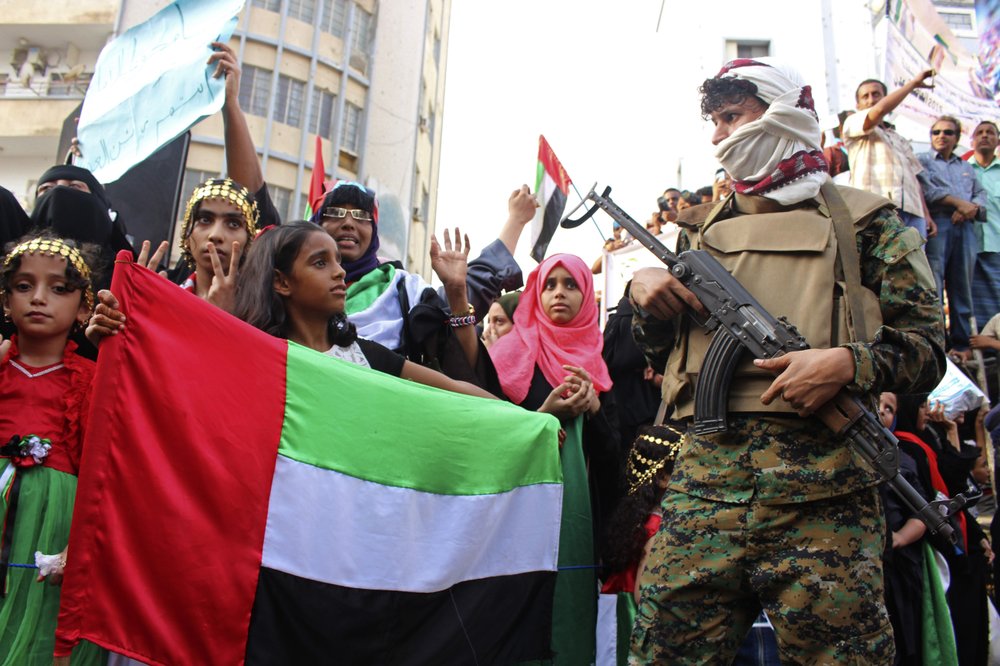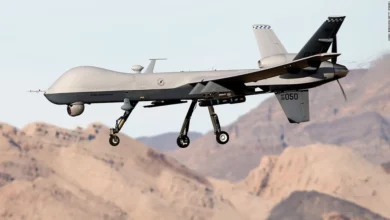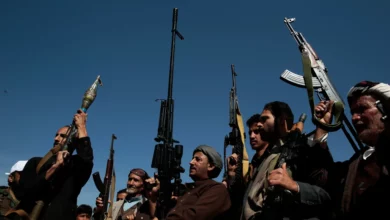Yemen’s uprising began nearly five months ago on the day Tunisia’s president Zine al-Abdin Ben Ali was ousted from power. To the surprise of many, the country began its own peaceful revolution despite the fact that the country has one of the top three rates of gun-ownership per-capita in the world.
Over the last two days, however, forces close to Ali Abdullah Saleh, the embattled president of 33 years, violently cleared the Square of Freedom in the city of Taiz, killing at least 68 people. The Yemeni uprising has seen at least 300 civilian deaths so far. On Tuesday, there were reports of heavy gunfire from the Square of Change in front of the Sana’a New University as demonstrators were attacked.
Sana’a’s airport is closed and Saleh’s forces have the city virtually isolated from the outside world. The situation has left many stranded, unable to make their way back to the Yemeni capital from abroad.
Ali al-Sarari is one of those people. The veteran Yemeni politician is a member of the Secretariat of the Yemeni Socialist Party and also a well-known journalist, having worked as editor-in-chief of more than one Yemeni daily newspaper. He originally came to Egypt for medical reasons and was due to return to Yemen last week.
In an interview with Al-Masry Al-Youm, Sirari discussed Yemen’s future, the complexity of the tribal and religious situation, and the legacy that President Saleh has left behind.
Sirari was one of many who feared that the revolution would begin violently.
“Yemenis had a view of themselves that they’re violent. Carrying weapons is a very traditional thing in tribal communities. The tribes put down their weapons and stood peacefully. It was very encouraging to see,” he said.
Sirari says that, like other uprisings of the so-called Arab Spring, Yemen’s was spontaneous. The main opposition coalition, the Joint Meeting Parties, which includes leftists, Islamists (Sunni and Shia) and Arab Nationalist parties, have only played a peripheral role, while the phenomenon of the sit-ins in open squares is where the uprising’s real legitimacy lies.
Since the beginning of Saleh’s reign in 1979, Yemen has been plagued by tribal wars and feuds that cost thousands of lives annually. With the exception of Sana’a, men in towns and villages in Sana’a openly carry their weapons.
Many accuse Saleh of fomenting tribal warfare and internal strife as a method of maintaining control over the country. “Saleh’s main strategy for maintaining power was creating internal rifts,” Sirari said.
Sirari added that Saleh’s regime has been responsible for encouraging and perpetuating many such wars, sometimes funding and arming opposing sides simultaneously, he added.
The success of the Egyptian and Tunisian revolutions in ousting their heads-of-state provides and inspirational \example for young Yemenis, according to Sirari, many of whom have grown weary of armed conflict.
“Yemenis have shown a profound desire for an upstanding, legal civil society that is governed by the rule of law. They are all tired of the state of chaos that has plagued the country,” he said.
So far, warring tribes are standing side-by-side in different sit-ins around the country.
Saleh, though, has use provocations to test demonstrators’ peaceful resolve. His forces have opened fire on the protesters several times. After the "Friday of Dignity” on 19 March, which left over 50 dead, military commanders from the First Battalion decided to join the uprising, pledging to protect Sana’a’s sit-in. Since then, Saleh’s provocations have been less consistent, with protesters only being attacked or harassed from afar or on the periphery of squares – until Tuesday night.
The Presidential Guard, a force run by Saleh’s sons and nephews reportedly opened fire on some locations where the First Battalion stood guard.
“Military commanders who decided to join the uprising didn’t defect, and did not intend to instigate any confrontation with Saleh’s forces. They saw the uprising as a legitimate shift of power and decided to protect it,” Sirari said. In addition to the First Battalion, many other generals defected, including some from the Presidential Guard.
Earlier this week, Saleh decided to test tribal resolve to remain peaceful by attacking a house belonging to opposition tribal leader Sadeq al-Ahmar of the Hashed tribe, which also happens to be Saleh’s own tribe as well. Al-Ahmar’s forces retaliated by taking control of certain government buildings.
“Up until now, unprovoked attacks have come from one side only. Opposition tribes have only retaliated outside the squares, in order to maintain the revolution’s peaceful nature,” Sirari said.
However, he thinks that continued attacks will lead to more retaliation and bloodshed, increasing the possibility of open confrontation between those supporting the revolution and Saleh’s forces. “Given how things are going, it’s very possible and expected that there will be tougher retaliation from the opposition,” he added.
The presence of Al-Qaeda and Salafis has added another dimension to violence in Yemen. Sirari says that while some Al-Qaeda members from the international organization exist in Yemen, the majority of those identified as belonging to the group are Saleh’s pawns, used to keep certain areas unstable and to neutralize enemies.
On Sunday, the city of Zanjibar fell to Islamist gunmen, who the Yemeni government identifies as including Al-Qaeda elements. “There’s no doubt that they left on the orders of Saleh. The Presidential Guard conspicuously pulled out of the city before the gunmen attacked, leaving it to them,” Sirari said.
Al-Qaeda has always been used as a scarecrow to maintain Western support for Saleh’s regime, according to Sirari. Many speculate that the fall of Zanjibar was an attempt to play that card once more and raise the specter of Islamist extremism that could undermine foreign support for the uprising.
However, Saleh now seems to be running out of allies and alibis; his erratic behavior and violent attacks are seen as attempts to crush the opposition as quickly as possible, regardless of future implications. “Saleh is losing a great many of his allies, because they only go as far as he is able to pay them,” Sirari said.
Despite the fact that Saleh assumed power with the blessing and financial backing of Saudi Arabia, even the Gulf Cooperation Council (GCC) countries, usually supportive of Saleh, appear to want him out.
Saleh rejected a peace initiative brought forth by the GCC over a month ago. The deal would have allowed him to leave peacefully. The GCC countries have been generally averse to openly supporting any of the region’s uprisings.
“He has become a liability to the GCC, because he has become addicted to blackmailing them… but they want to make sure they can control the power transfer,” said Sirai.
Saleh may be fighting his last battle, or he may have begun a war that could drag on for much longer. In either case, his shifting positions have been erratic and generally unintelligible.
“Ali Abdullah Saleh is a person whose actions you can never attempt to make sense of. He is a one-off phenomenon who wakes up in the morning only to think as far as getting to the night ahead of him,” Sirari said.
Sirari believes that the Yemeni people are ready to transition to a civil state, and have seen enough poverty and turmoil under Saleh’s reign to appreciate the importance of change.
“We have had enough wars, bloodshed, and mayhem,” said Sirari.




